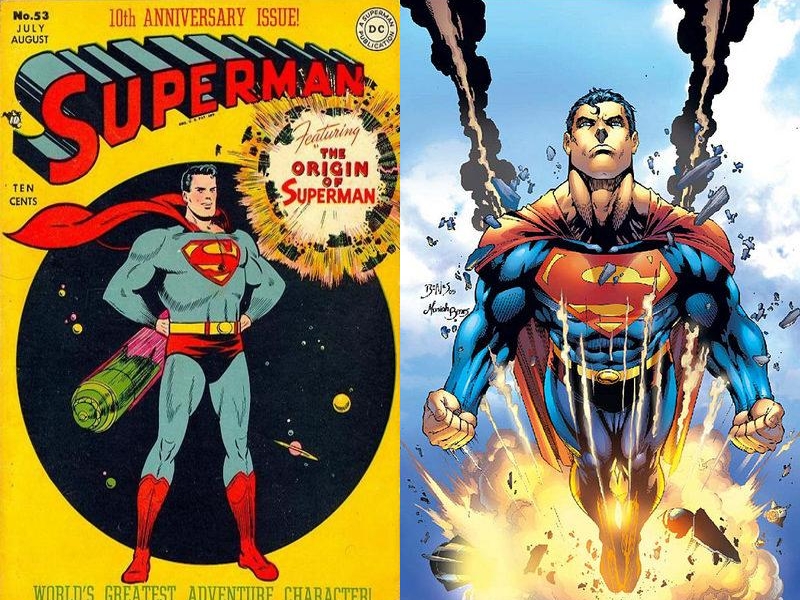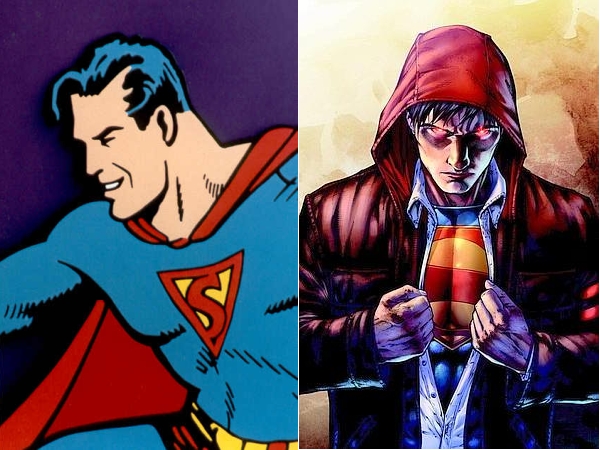To me, Clark Kent in a phone booth and Houdini in a packing crate, they were one and the same thing. You weren’t the same person when when you came out as when you went in. Houdini’s first magic act, you know, back when he was just getting started. It was called “Metamorphosis.” It was never just a question of escape. It was also a question of transformation.
Sam Clay in Michael Chabon’s The Amazing Adventures of Kavalier & Clay
For those who haven’t been following along, I recently found Superman Last Son of Krypton, a 10 CD set of old Superman radio plays from the late 1940s, in my local library. Check out parts one, two, three and four for reviews of each episode. Suffice to say, I enjoyed the collection, particularly the voicework. Sound effects and mixing are a little hard on the ears, but it’s over 60 years old. I’ll be keeping an eye out for similar packages about Superman or other characters. As for story elements and character building, it’s caused me to think about the character a lot for the last few weeks. Part five of my review is a much more personal editorial on the character and his evolution as highlighted by the collection. Ultimately, this set forced me to ask a tough question: Who’s better, 1940s Superman, or today’s?
Superman was created by Jerry Siegel and Joel Shuster in 1930s and was intended for newspaper comics. He eventually found a home in comic books, a relatively new medium, in April 1938. What often gets missed by history is the evolution of his power. Why would we say a man who can fly is “able to leap tall buildings in a single bound?” Because he wasn’t always able to fly. Originally the sum total of his powers was the “strength of a hundred men” and bullet proof skin. Over time he had heat vision, flight, survival in vacuum, powerful breath, etc. Unlike most people, I’ve always had a bit of a fondness for the underpowered Superman. I like the idea that he’s not completely invulnerable, that perhaps fighting a hundred human men could mean he’d be defeated. I like that stopping a moving roller coaster is a difficult task, compared to pulling a jumbo jet out of the sky and setting it down in a baseball field with relative ease.
With his growing power a weakness was needed. It was in radio that the weakness, kryptonite, was created; but not for Superman. It was needed for the voice actor, Bud Collyer to take some time off. [Side note: The radio series set a precedent for the character by using the the same man for the voice of Kent and Superman. In film and television this is practically mandatory, but in radio could easily have been done with different people. Collyer’s ability to shift registers mid-sentence saved the producers money and makes the whole endeavor better for history.] Unfortunately none of the episodes included in this collection even mentioned kryptonite. I would have liked to hear the early uses of this plot device. Of course, with no kryptonite, his greatest human foe is at a severe disadvantage. Such a disadvantage in fact, that the collection is also missing Lex Luthor, who first appeared in comics in April 1940. One episode does feature a mad scientist, but he’s not really bent world domination, just coaxing young men into his rocket. There are also no other super-powered creatures or people for Superman to fight. This could be considered boring, and by the end of the set I was pining for a monster or alien, but it was also refreshing. Along with enjoying the underpowered Superman, I also feel the character works best in a world where he is the only superhero. That doesn’t quite happen here, as the first collected story over four discs utilizes Batman and Robin but neither of them have any special powers (and actually get beaten up several times). Despite all of this, I really have to wonder about Superman being used to fight organized crime. It was certainly the big bogeyman of the day, but is cheapened by my modern view of human trafficking, drug dealers, street gangs, etc. There is one obvious side benefit of a weaker Superman fighting thugs instead of monsters, much less property damage.
One of the most telling differences between this Superman and today’s version is his role as an investigative reporter. Sure, Clark Kent is still a reporter for the Daily Planet, but it seems he doesn’t spend as much time tracking down leads as his radio predecessor. Clark, in the radio set, is very much a private investigator. Even as Superman it’s very clear he doesn’t always know the culprit or motivations. In this way, many of these episodes seem like procedural police dramas from modern television, even if they are as hokey as Murder She Wrote. Despite having to work completely via sound and in smaller time frames (12-30 minutes depending on the era), the radio episodes have some very good, though outdated, mystery stories. Comparatively, it seems that modern Superman cares less about finding the evidence to convict a criminal than he does about just punishing the people he sees as guilty (see Superman Grounded before Roberson took over).
Also, this older Superman is very clear in his intentions with fighting for “truth, justice and the American way.” [That line was also first used in radio in 1942, retired in 1944 and reborn in the McCarthy era television series of the 1950s.] Modern Superman seems very torn on many issues. Whether it’s disarming all the nuclear weapons, fighting for the refugees of Krypton to have their own planet, or stalking an affianced woman and her son, Superman’s aims have shifted. That’s not necessarily a bad thing, it’s just a way of showing that his strength of character has had a bit of an inverse relationship with his physical powers. The strong-willed Superman of radio is underpowered in comparison to his modern equivalent, but his motivations are much clearer and lead him to faster decisions. The exception to this observation is the whiny, conflicted Smallville Clark that doesn’t fly. There are many indicators in comics that the character is going to become even more brooding, which means you can probably expect him to gain even more power. Maybe Zack Snyder will have him testing Archimedes’ lever theory while sobbing about whether or not he should get a cat or a dog.
Speaking of Zack Snyder, there has been much speculation about whether his new movie will be yet another origin story of a 73 year old character that practically defines American pop culture. Please Mr. Snyder, listen to this collection before you start. It’s got all the origin story you need in fifteen seconds:
When the planet Krypton, home of a race of supermen exploded into dust, the sole survivor was an infant boy who had been shot to Earth in a sealed rocket. Today that boy, grown to manhood is known as Superman, sworn enemy of the forces of evil. To aid him in his neverending fight for truth and justice, he masquerades as Clark Kent, crime reporter for a great metropolitan newspaper. His secret is carefully guarded. No one is aware that Kent is Superman. No one but you.
Seriously, can’t we leave it at that? There is much in this series that indicates everything was much simpler and more to the point in the 1940s. Sure, at times the characters seem completely ignorant, and the ethnic and gender stereotypes don’t always match the programs’ explicit message of tolerance and equality. But it also lacks many of the complications of any story told today. It served to remind me how much fun a comic book can be when I just read it for what it is and ignore all the commentary from geeks and bloggers (myself and fellow ‘bots included). When Superman is at his best, then or now, it doesn’t matter if nerds like us think it’s physically possible for him to impregnate Lois. He doesn’t need to be dark, or brooding, or conflicted. Superman can have a story that pitches him as a god among mortals without being highminded or complicated. There’s a place for those stories, and I hope DC keeps publishing them (or filming them or whatever). But there’s also a place for him to pop a thug in the jaw just because he deserves it. Ultimately, for me, the radio era Superman is a better character, but the stories and tropes don’t stand up as well to a modern listener. Nothing would make me happier than to see new stories about that Superman. Until that happens, I’ll just have to find me another collection.
***
Superman Last Son of Krypton is currently available from Radio Spirits. This set was published in May 2006; the episodes originally aired between March 1948 and December 1949.

